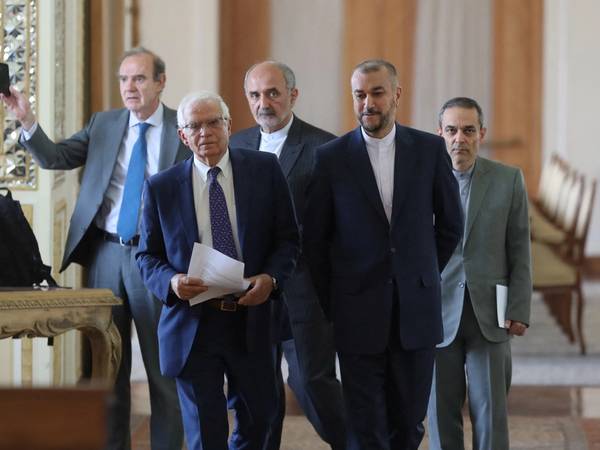Qatar is more likely to be the venue of talks between Washington and Tehran to revive the 2015 nuclear deal, a website close to Iran’s security council said Sunday.
Nour News, usually reflecting the views of the Supreme National Security Council Secretary, Ali Shamkhani, said, “Considering the continuing efforts by Qatar to help re-start talks for the lifting of US sanctions, Doha’s chances for hosting the upcoming negotiations are higher than other Persian Gulf countries.”
A two-day visit by the European Union’s foreign policy chief Josep Borrell to Tehran appeared to have succeeded on Saturday in convincing Iran to have talks with the United States to resolve remaining differences that have blocked an agreement to revive the JCPOA.
The key factor that prevented an agreement in Vienna in March, when year-long talks came to a standstill, is Iran’s demand for the removal of its Revolutionary Guard from a US terrorist list.
There is no official word from Washington yet, if the Biden Administration agrees with a formula to hold talks with Iran apparently outside the JCPOA framework. What Borrell seems to have agreed with Iran would probably exclude Russia and China, two of the original JCPOA signatories from this round of talks.
Washington might be waiting for a briefing by Borrell to see the details of his discussions with the Iranians, but some coordination must have taken place before the EU foreign policy chief flew to Tehran on Friday.
US Special envoy for Iran and chief nuclear negotiator, Rob Malley, was in Brussels before Borrell’s trip and a tweet on Thursday [June23] showed him having dinner with Borrell and his deputy Enrique Mora.
Al Jazeera also reported on Sunday that according to an Iranian official Qatar has the best chance for hosting the new talks.
Israel’s Channel 12 television quoted a security official as saying that Israel has objected to the prospect of the JCPOA being revived in the near future. The source said that restoring the 2015 agreement in its current form would be “very bad” for Israel.
Israel says that the JCPOA’s sunset clauses would mature in a few years and Iran would be free to expand its nuclear program and build atomic weapons. The deal was weak from the beginning when the Obama administration negotiated it, Israel has always argued and supported for President Donald Trump’s decision to withdraw from the agreement in 2018.
Saudi Arabia and its Arab allies, although less vocal publicly, are equally alarmed not only at Iran’s nuclear program but also for its aggressive regional behavior, arming and supporting militant groups.
Washington is said to be working to lead a regional alliance of Israel, Saudi Arabia and other Arab countries to contain Iran. Israeli officials said this week that work is in progress to set up a joint air defense system between these countries, led by the US.
Iran’s Shamkhani told Borrell that Iran will further develop its nuclear programme until the West changes its "illegal behavior".
"Iran's retaliatory actions in the nuclear sector are merely legal and rational responses to US unilateralism and European inaction and will continue as long as the West's illegal practices are not changed," Shamkhani said, without elaborating.
And despite the imminent resumption of talks, Borrell appeared to play down the possibility of a quick deal.
"I cannot predict ... We are pushing for it. I appreciate the goodwill from the Iranian side. There is also goodwill from the American side," Borrell said in a news conference on an EU website.
